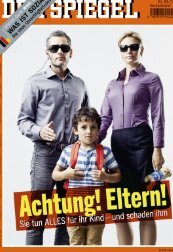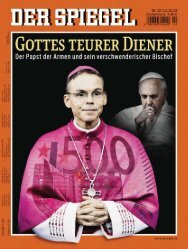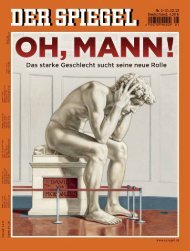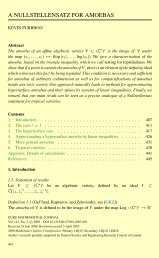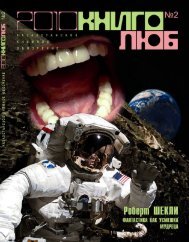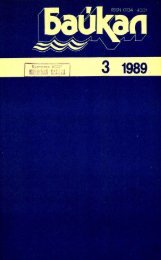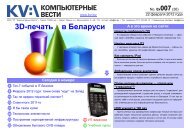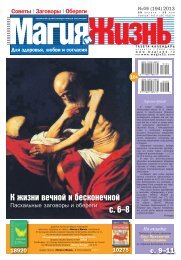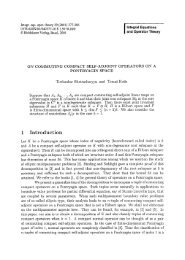computing lives - FTP Directory Listing
computing lives - FTP Directory Listing
computing lives - FTP Directory Listing
You also want an ePaper? Increase the reach of your titles
YUMPU automatically turns print PDFs into web optimized ePapers that Google loves.
A<br />
Computer Previous Page | Contents | Zoom in | Zoom out | Front Cover | Search Issue | Next Page M S BE<br />
aG<br />
F<br />
28<br />
COMPUTING PRACTICES<br />
discipline-specific courses. Carnegie Mellon University’s<br />
Doha, Qatar, campus hosted a summer 2009 version of this<br />
course, while the freshman seminar is slated to be offered<br />
in Pittsburgh during spring 2010.<br />
Puzzle-based learning is an in-progress experiment<br />
that seeks to foster general domain-independent<br />
reasoning and critical thinking skills that can lay<br />
a foundation for problem-solving in future course<br />
work. As fun as puzzles inherently are, they provide<br />
only a means to this pedagogical end. Our preliminary<br />
experience in different instantiations of the course and<br />
educational contexts has been encouraging and well<br />
received as we explore this approach. We continue collecting<br />
relevant data to demonstrate the benefit of our<br />
approach. Early results 13 indicate that students who enroll<br />
in our course perceive an improvement in their thinking<br />
and general problem-solving skills.<br />
References<br />
1. B. Parhami, Puzzling Problems in Computer Engineering,<br />
Computer, Mar. 2009, pp. 26-29.<br />
2. A. Fisher, Critical Thinking: An Introduction, Cambridge<br />
University Press, 2001.<br />
3. University of Adelaide, Mathematics Working Party<br />
Final Report, internal document, June 2008.<br />
4. G. Polya, How to Solve It: A New Aspect of Mathematical<br />
Method, Princeton Univ. Press, 1945.<br />
5. M. Gardner, Entertaining Mathematical Puzzles, Dover<br />
Publications, 1961.<br />
6. M. Danesi, The Puzzle Instinct: The Meaning of Puzzles<br />
in Human Life, Indiana Univ. Press, 2002.<br />
7. W. Poundstone, “How Would You Move Mount Fuji?”<br />
Microsoft’s Cult of the Puzzle—How the World’s<br />
Smartest Companies Select the Most Creative Thinkers,<br />
Little Brown and Company, 2000.<br />
8. P.C. Blumenfeld et al., “Motivating Project-Based<br />
Learning: Sustaining the Doing, Supporting the<br />
Learning,” Educational Psychologist, vol. 26, nos. 3<br />
and 4, 1991, pp. 369-398.<br />
9. J.D. Bransford et al., “Teaching Thinking and Problem<br />
Solving: Research Foundations,” Am. Psychologist,<br />
vol. 41, 1986, pp. 1078-1089.<br />
10. J.M. Wing, “Computational Thinking,” Comm. ACM,<br />
Mar. 2006, pp. 33-35.<br />
11. M. Gardner, Penrose Tiles to Trapdoor Ciphers, Mathematical<br />
Assoc. of America, 1997.<br />
12. F. Mosteller and D. Wallace, “Deciding Authorship,”<br />
Mathematics: People, Problems, Results, D.M. Campbell<br />
and J.C. Higgins, eds., Wadsworth Publishing,<br />
1984.<br />
COMPUTER<br />
13. N.J.G. Falkner, R. Sooriamurthi, and Z. Michalewicz,<br />
“Puzzle-Based Learning: The First Experiences,”<br />
Proc. 20th Ann. Conf. Australasian Assoc. for Eng.<br />
Education (AaeE 09), 2009.<br />
Nickolas Falkner is a lecturer in the School of Computer<br />
Science at the University of Adelaide. He received a PhD in<br />
discovery and classification of information in large systems<br />
from the University of Adelaide. His research interests<br />
include wireless sensor networks, automated network configuration,<br />
data fusion, and data stream management.<br />
He is also active in educational research, with a focus on<br />
increasing student participation, retention, and enthusiasm.<br />
Contact him at jnick@cs.adelaide.edu.au.<br />
_________________<br />
Raja Sooriamurthi is an associate teaching professor<br />
with Carnegie Mellon's Information Systems Program and<br />
also has a faculty appointment at Carnegie Mellon's Heinz<br />
College. He received his PhD in computer science from Indiana<br />
University, Bloomington. His research interests are in<br />
artificial intelligence, case-based reasoning, and CS/IS pedagogy.<br />
His pedagogical efforts have been recognized with<br />
several awards for distinguished teaching. Sooriamurthi<br />
is a member of the IEEE Computer Society, the ACM, and<br />
Decision Sciences Institute. Contact him at raja@cmu.edu.<br />
__________<br />
Zbigniew Michalewicz is a professor in the School of<br />
Computer Science, University of Adelaide. He is also at<br />
the Institute of Computer Science, Polish Academy of Sciences<br />
and at the Polish-Japanese Institute of Information<br />
Technology, Poland. He received a PhD in computer science<br />
from the Polish Academy of Science. His research interests<br />
include problem-solving methodologies, evolutionary computation,<br />
modern heuristic methods, and adaptive business<br />
intelligence. Michalewicz is a Fellow of the Australian Computer<br />
Society. Contact him at zbyszek@cs.adelaide.edu.au.<br />
___________________<br />
Selected CS articles and columns are available for free<br />
at http://ComputingNow.computer.org.<br />
For more information<br />
on any topic<br />
presented in Computer,<br />
visit the IEEE<br />
Computer Society<br />
Digital Library at<br />
www.computer.org/csdl<br />
A<br />
Computer Previous Page | Contents | Zoom in | Zoom out | Front Cover | Search Issue | Next Page M S BE<br />
aG<br />
F



